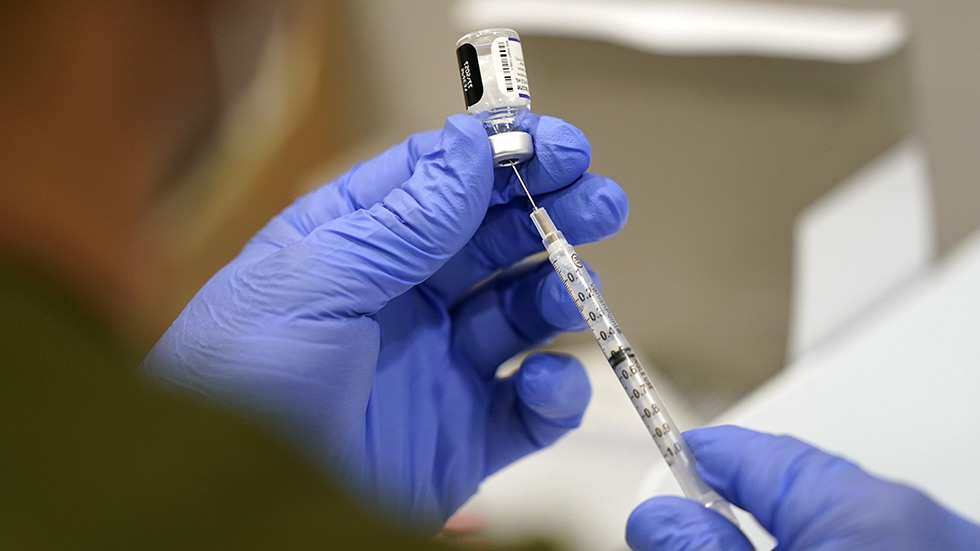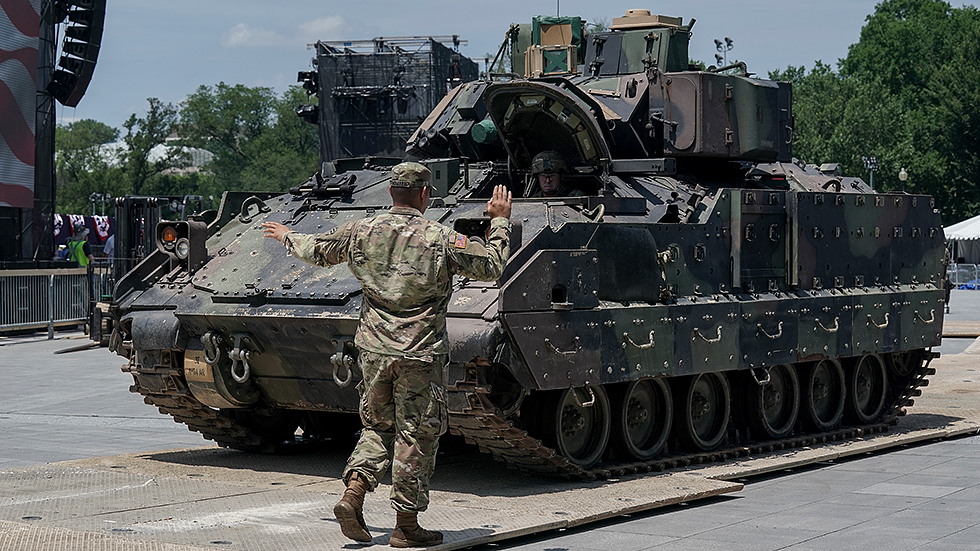Overnight Defense & National Security — Presented by Boeing — Major Russia weapons test stokes tensions

It’s Monday, welcome to Overnight Defense & National Security, your nightly guide to the latest developments at the Pentagon, on Capitol Hill and beyond. Subscribe here: digital-stage.thehill.com/newsletter-signup.
A major Russian anti-satellite weapons test has created a potentially dangerous field of around 1,500 pieces of debris in space and sparked U.S. concerns.
We’ll share details of the Russian effort and the Biden administration’s response, plus the Pentagon’s pushback on Oklahoma refusing to enforce its vaccine mandate for National Guard troops
For The Hill, I’m Ellen Mitchell. Write to me with tips: emitchell@digital-stage.thehill.com.
Let’s get to it.
Russia strikes satellite, creates space debris

A major Russian anti-satellite weapons test earlier Monday created a potentially dangerous field of around 1,500 pieces of debris in space, U.S. officials confirmed.
At risk: CNN was the first to report on a rare “debris-generating event,” which the State Department later said put the International Space Station and all global systems and astronauts in space at risk.
“Earlier today the Russian Federation recklessly conducted a destructive satellite test of a direct anti-satellite missile against one of its own satellites,” State Department spokesman Ned Price told reporters during the daily press briefing.
“The test has so far generated over 1,500 pieces of trackable, orbitable debris” as well as hundreds of thousands of pieces of smaller debris “that now threaten the interests of all nations,” he said.
What did the missile strike?: Space analysts quickly tracked the target of the missile as Cosmos-1408, a now defunct satellite launched by the Soviet Union in 1982.
Price said Washington will now work with allies and partners to respond to the “irresponsible act,” which involved the launch of a missile from the ground.
The Pentagon’s response: Pentagon spokesman John Kirby also confirmed the test and said while the immediate concerns center around the space debris, “we watch closely the kinds of capabilities that Russia seems to want to develop.”
Such Kremlin capabilities could “pose a threat not just to our national security interests but the security interests of other space faring nations.”
Kirby added that the United States wants to see space “subject to international norms and rules,” and that Washington was not notified of the test beforehand.
Growing tensions: Space has become a hotly contested domain in recent years, with the United States, Russia and China all building their arsenals of anti-satellite weapons, lasers and other armaments to prevent each other from effectively using their satellites.
The incident is sure to raise already high tensions between Washington and Moscow, which are currently at odds over a buildup of Russian troops near its border with Ukraine. The Kremlin has insisted the military buildup is a reaction to NATO military activities.
A MESSAGE FROM BOEING
Boeing is helping the U.S. and its allies get ready for the future fight with digitally advanced, flexible real-time mission support to win at the speed of now. Learn more.
DOD: Oklahoma Guard must follow mandate

The Pentagon can require Oklahoma National Guard members to get the COVID-19 vaccine, despite the state’s highest-ranking military official insisting he will not mandate that members be inoculated, the Defense Department’s top spokesperson said Monday.
Defense Secretary Lloyd Austin “has the authorities he needs to require this vaccine across the force, including the National Guard,” press secretary John Kirby told reporters.
A ‘lawful order’: “It is a lawful order for National Guardsmen to receive the COVID vaccine. It is a lawful order,” Kirby later said. “Refusing to do that, absent an approved exemption, puts them in the same potential [for punishment] as active-duty members who refuse the vaccine.”
Austin in mid-September mandated that all uniformed personnel get vaccinated for the coronavirus, although the deadline to do so varies across branches.
The conflict: Last week, however, the newly appointed commander of the Oklahoma National Guard, Army Brig. Gen. Thomas Mancino, wrote in a memo that no member of the Oklahoma National Guard will be required to get vaccinated.
Mancino further writes that “no negative administrative or legal action will be taken” against guardsmen who refuse to get vaccinated.
Oklahoma Gov. Kevin Stitt (R), who has vocally opposed vaccine mandates, said Wednesday he appointed Mancino to serve as the state’s Adjutant General and National Guard commander, though he still has to be confirmed by the state Senate.
Response pending: Kirby said Austin had not reached out to Stitt but will “respond appropriately.”
JUDGE REJECTS CHALLENGE TO VAX MANDATE
A judge on Friday rejected ex-Trump lawyer Sidney Powell’s challenge of the Pentagon’s vaccine mandate.
The lawsuit in question: Powell’s Texas-based group, dubbed Defending the Republic, filed a lawsuit in October on behalf of 16 active-duty service members “in support of their right to refuse” the COVID-19 vaccine.
The lawsuit named Defense Secretary Lloyd Austin, Health and Human Services (HHS) Secretary Xavier Becerra, acting Food and Drug Administration (FDA) Commissioner Janet Woodcock, Secretary of the Air Force Frank Kendall, Navy Secretary Carlos Del Toro and Army Secretary Christine Wormuth as defendants.
An unsuccessful argument: The plaintiffs argued that the vaccine mandate imposed “unconstitutional conditions by forcing Plaintiffs to choose between violation of their constitutional rights or facing life-altering punishments,” and argued that the FDA’s approval of the Pfizer-BioNTech vaccine was unconstitutional.
They said the vaccine mandate was invalid because it did not go through required “notice-and-comment rulemaking.”
The lawsuit specifically asked the court to block the Pentagon from implementing the mandate and compel the FDA to retract its approval of the Pfizer vaccine.
The ruling: U.S. District Judge Allen Winsor on Friday, however, ruled that the plaintiffs’ lawsuit did not reach the “extraordinary burden of showing the mandate lacks any rationality.”
He said there was a slim chance that the service members’ assertion regarding the “notice-and-comment rulemaking” would stand because the vaccine mandate was announced one day after the FDA granted full approval to the Pfizer-BioNTech vaccine.
“On the merits, the plaintiffs haven’t made a substantial showing that the FDA acted without a reasonable scientific basis,” Winsor, a Trump appointee, wrote in the ruling. “The FDA is entitled to substantial deference because drug licensing decisions involve ‘scientific determination[s]’ within the FDA’s ‘area of special expertise.’”
Read more about the lawsuit here.
Senate ‘likely’ to take up NDAA

The Senate’s debate over President Biden’s social and climate spending bill appears likely to slip after the House failed to send the bill over before the Veterans Day recess.
Senate Majority Leader Charles Schumer (D-N.Y.) had hoped to start debate on the Build Back Better legislation this week. But in a letter sent to the Senate Democratic caucus on Sunday, he said the Senate is “likely” to take up the National Defense Authorization Act (NDAA), a massive defense policy bill, instead.
“Due to the House pushing back consideration of the BBBA to the week of November 15th, it is likely that the Senate considers the NDAA this upcoming week as we await House passage of the BBBA,” Schumer wrote, referring to the Build Back Better Act.
In limbo: Though the defense bill passed out of committee over the summer, when it could come the Senate floor has been in limbo as Democrats have tried to figure out the timing of the bipartisan infrastructure bill, which passed the Senate in August, and the social and climate spending bill.
The defense bill typically passes by a wide bipartisan margin but is a magnet for hundreds of potential changes, and it can take roughly two weeks to get the bill on to the floor and to a final vote.
Also on the agenda: Schumer, in his letter, noted that the Senate’s defense bill debate will include a vote on repealing the 2002 Iraq War authorization. He’s also mulling adding in China competitiveness legislation that passed the Senate earlier this year but has stalled in the House.
A MESSAGE FROM BOEING
Boeing is helping the U.S. and its allies get ready for the future fight with digitally advanced, flexible real-time mission support to win at the speed of now. Learn more.
ON TAP FOR TOMORROW
- Chatham House will hold a discussion on “Developments in International Nuclear and Arms Security,” at 8 a.m.
- The International Institute for Strategic Studies will host a talk on “Western Responses to China’s Belt and Road Initiative” at 8:45 a.m.
- National Security Advisor Jake Sullivan will give a readout from the Biden-Xi virtual meeting at The Brookings Institution at 10 a.m.
- A House Foreign Affairs subcommittee will hold a hearing on “National Security Implications of Climate Change in the Arctic,” at 10 a.m.
- Former Defense Secretary Mark Esper, retired Marine Corps Maj. Gen. Arnold Punaro, former Senate Armed Services Committee Chairman Sam Nunn (D-Ga.), former House Armed Services Committee Chairman Mac Thornberry, (R-Texas) will speak at a Center for Strategic and International Studies, discussion on “The Ever-Shrinking Fighting Force” at 12 p.m.
- The Hudson Institute will hold a talk on “Is a Nuclear Iran Inevitable?” at 12 p.m.
- The Senate Intelligence Committee will hold a closed briefing on intelligence matters at 2:30 p.m.
- The Center for a New American Security will hear from Air Force Lt. Gen. Clint Hinote, Deputy Chief of Staff for Strategy, Integration and Requirements, on “Designing the Air Force America Needs,” at 3 p.m.
- The Belfer Center for Science and International Affairs will host a discussion on “What’s Happening in Sudan?” at 4:30 p.m.
WHAT WE’RE READING
- Republicans call for dozens of Biden officials to testify on Afghanistan
- NATO chief warns of ‘significant’ Russian military build-up along Ukraine border
- EU to broaden sanctions against Belarus amid migrant crisis
- Israeli security officials call for reopening US Consulate to Palestinians in Jerusalem
- Threat level rises in UK after taxi explosion
- Stoltenberg says Jan. 6 siege was attack on ‘core values of NATO’
- The Hill: Opinion: A strategic challenge for the US: China and the Bahamas
That’s it for today. Check out The Hill’s defense and national security pages for the latest coverage. See you Tuesday.{mosads}
Copyright 2023 Nexstar Media Inc. All rights reserved. This material may not be published, broadcast, rewritten, or redistributed. Regular the hill posts







